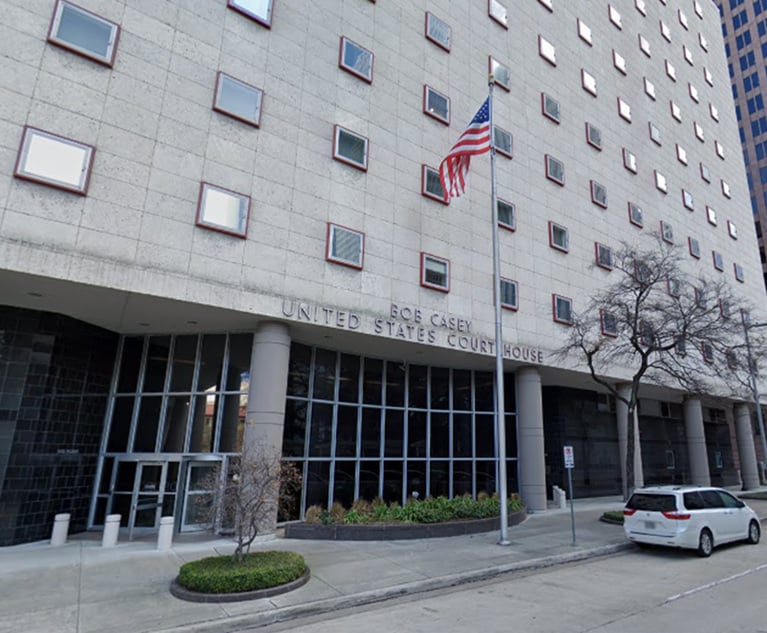Firms Walk a Tightrope Investigating Sexual Impropriety at Universities
The laws governing the disclosure of witness names are not well understood by law firms clamoring to engage in the growing and lucrative field of campus investigations, and there is no widespread agreement over how those rules should be applied.
February 28, 2018 at 11:15 AM
6 minute read
 Harvard's campus.
Harvard's campus.
What promises can law firms make about confidentiality in campus sexual harassment and assault investigations? That question arose when the news surfaced in January that a team of Debevoise & Plimpton lawyers led by partner Mary Jo White briefly disclosed the names of confidential witnesses in their long-awaited report on the University of Rochester's handling of a sexual harassment scandal.
White, who declined to comment for this story, told a campus newspaper that the disclosure was an “error.” Since her team's report and attachments were quickly amended to anonymize the confidential information—not before some witnesses discovered their names had been made public—that likely was the case.
But, according to lawyers who investigate and help adjudicate sexual harassment allegations on campus, the applicable laws governing whose names may be disclosed to whom are not well understood by big firms clamoring to engage in the growing and lucrative field of campus investigations—Debevoise billed the Rochester trustees $4.5 million for its report—and there is no widespread agreement over how those rules should be applied.
“This is such a new field and the litigation is kind of fast-paced because of injunctions,” says Susan Kaplan of The Kaplan Law Office in New York, who serves on the advisory board of Families Advocating for Campus Equality, a nonprofit seeking to bolster due process principles at universities. “There is a great range of competence.”
Along with Debevoise, the list of firms known for conducting investigations includes Ropes & Gray, Cozen O'Connor and Paul, Weiss, Rifkind, Wharton & Garrison. The controversial nature of the allegations they research means most firms engaged in the practice have drawn criticism at some point.
“I definitely see a number of firms handling confidential information in too casual a manner,” says Brett Sokolow, the president and CEO of The National Center for Higher Education Risk Management, which has lawyers and other consultants focused on campus investigations.
Sokolow said misconceptions abound, including “a nebulous idea” that all such investigations “are supposed to be confidential”—a concept absent from Title IX of the Education Amendments of 1972, the comprehensive federal law that prohibits discrimination on the basis of sex in any federally funded education program or activity. In contrast, the Family Educational Rights and Privacy Act (FERPA), which governs the release of information pertaining to students' educational records, calls for investigators to get a student's consent before interviewing them.
But promises of confidentiality can be “so much vapor,” Sokolow says, depending on administrators or trustees' commitments to them; those commitments can waver at later stages of an investigation and after publication of a report.
Many law firms, jumping at the opportunity to engage in campus investigations—high-dollar work that keeps lots of lawyers busy for weeks—may be vying for the business and getting engaged without fully understanding the laws that govern confidentiality, including the Clery Act, which links federal financial aid to universities' disclosure of campus crime statistics.
“I've got to get up to speed with the Clery Act,” Sokolow recalls co-counsel from another firm telling him after the lawyer was retained by a university to help conduct an investigation. Sokolow was stunned the client would pay for the lawyer to learn such basic information. But he also recognizes that many schools, when caught in the high-profile quagmire of a sexual assault or harassment case, select their counsel not based on the lawyers' expertise but because of political and ideological ties.
Some universities and their lawyers have attempted to use the widespread misunderstandings regarding confidentiality to their advantage, citing FERPA as a reason for not disclosing information to accusers and the accused. Sokolow and others in the field dismiss that tactic.
In a blog post, Anne Cartwright, senior counsel at Husch Blackwell, warned prospective clients against using FERPA as a shield: “When responding to an open records law request, if a school errs on the side of not disclosing requested information pursuant to FERPA or other privacy laws or guidance, it could set itself up for potential litigation from the requesting entity for violating the public records laws—and it may ultimately be forced to disclose the information.”
In September 2017, U.S. Secretary of Education Betsy DeVos made remarks widely interpreted to mean she planned on considering policy changes that would pull the federal government back from the Obama-era pressure on universities to aggressively combat sexual assault and harassment. “Schools must continue to confront these horrific crimes and behaviors head-on. There will be no more sweeping them under the rug. But the process also must be fair and impartial, giving everyone more confidence in its outcomes,” DeVos said.
At the same time, the agency also posted online an “interim” Q&A to provide new guidance to schools investigating allegations. In it, the department outlined how universities should notify parties of an investigation's outcome, suggesting a written notice whose content would vary depending on the allegations, the institution and the students' ages. The Q&A also outlined that under the Clery Act—implicated when alleged criminal activity is part of an allegation—universities must include “the rationale for the result and the sanctions.”
If the allegations are not criminal, the school still must “inform the reporting party whether it found that the alleged conduct occurred,” along with any remedies offered, sanctions imposed or other steps taken to address the situation.
Given the web of laws that could apply to an allegation, as well as a university's own policies and intentions, when big firm lawyers arrive on campus, what do they tell potential witnesses? Here's what Debevoise's team told some prospective witnesses at the University of Rochester, per an Oct. 24, 2017, email from partner Mary Beth Hogan:
“I understand if you do not want to talk. But I do want to clarify something. … No one outside our investigative team will even see our report or know anything of our findings until we present it to the board and the public on the same day.”
In another email to a potential witness, Hogan wrote, “We will protect your anonymity and that of others identified in your written statement.”
Given those kinds of assurances, when the Debevoise team initially posted attachments with some names still on them, witnesses were upset.
The Rochester situation shows that campus investigations like these offer little upside for university clients, who are caught between a rock and a hard place, Kaplan says.
“There are lots of subjective elements here,” Kaplan says, “so I'm generous to all sides.”
Email: [email protected].
This content has been archived. It is available through our partners, LexisNexis® and Bloomberg Law.
To view this content, please continue to their sites.
Not a Lexis Subscriber?
Subscribe Now
Not a Bloomberg Law Subscriber?
Subscribe Now
NOT FOR REPRINT
© 2025 ALM Global, LLC, All Rights Reserved. Request academic re-use from www.copyright.com. All other uses, submit a request to [email protected]. For more information visit Asset & Logo Licensing.
You Might Like
View All
Law Firms Expand Scope of Immigration Expertise Amid Blitz of Trump Orders
6 minute read
Am Law 100 Lateral Partner Hiring Rose in 2024: Report

KPMG's Bid to Practice Law in U.S. on Indefinite Hold, as Arizona Justices Exercise Caution

JCPenney Seeks Return of More Than $1.1M From Jackson Walker For Bankruptcy Work
3 minute readTrending Stories
- 1The Law Firm Disrupted: Scrutinizing the Elephant More Than the Mouse
- 2Inherent Diminished Value Damages Unavailable to 3rd-Party Claimants, Court Says
- 3Pa. Defense Firm Sued by Client Over Ex-Eagles Player's $43.5M Med Mal Win
- 4Losses Mount at Morris Manning, but Departing Ex-Chair Stays Bullish About His Old Firm's Future
- 5Zoom Faces Intellectual Property Suit Over AI-Based Augmented Video Conferencing
Who Got The Work
J. Brugh Lower of Gibbons has entered an appearance for industrial equipment supplier Devco Corporation in a pending trademark infringement lawsuit. The suit, accusing the defendant of selling knock-off Graco products, was filed Dec. 18 in New Jersey District Court by Rivkin Radler on behalf of Graco Inc. and Graco Minnesota. The case, assigned to U.S. District Judge Zahid N. Quraishi, is 3:24-cv-11294, Graco Inc. et al v. Devco Corporation.
Who Got The Work
Rebecca Maller-Stein and Kent A. Yalowitz of Arnold & Porter Kaye Scholer have entered their appearances for Hanaco Venture Capital and its executives, Lior Prosor and David Frankel, in a pending securities lawsuit. The action, filed on Dec. 24 in New York Southern District Court by Zell, Aron & Co. on behalf of Goldeneye Advisors, accuses the defendants of negligently and fraudulently managing the plaintiff's $1 million investment. The case, assigned to U.S. District Judge Vernon S. Broderick, is 1:24-cv-09918, Goldeneye Advisors, LLC v. Hanaco Venture Capital, Ltd. et al.
Who Got The Work
Attorneys from A&O Shearman has stepped in as defense counsel for Toronto-Dominion Bank and other defendants in a pending securities class action. The suit, filed Dec. 11 in New York Southern District Court by Bleichmar Fonti & Auld, accuses the defendants of concealing the bank's 'pervasive' deficiencies in regards to its compliance with the Bank Secrecy Act and the quality of its anti-money laundering controls. The case, assigned to U.S. District Judge Arun Subramanian, is 1:24-cv-09445, Gonzalez v. The Toronto-Dominion Bank et al.
Who Got The Work
Crown Castle International, a Pennsylvania company providing shared communications infrastructure, has turned to Luke D. Wolf of Gordon Rees Scully Mansukhani to fend off a pending breach-of-contract lawsuit. The court action, filed Nov. 25 in Michigan Eastern District Court by Hooper Hathaway PC on behalf of The Town Residences LLC, accuses Crown Castle of failing to transfer approximately $30,000 in utility payments from T-Mobile in breach of a roof-top lease and assignment agreement. The case, assigned to U.S. District Judge Susan K. Declercq, is 2:24-cv-13131, The Town Residences LLC v. T-Mobile US, Inc. et al.
Who Got The Work
Wilfred P. Coronato and Daniel M. Schwartz of McCarter & English have stepped in as defense counsel to Electrolux Home Products Inc. in a pending product liability lawsuit. The court action, filed Nov. 26 in New York Eastern District Court by Poulos Lopiccolo PC and Nagel Rice LLP on behalf of David Stern, alleges that the defendant's refrigerators’ drawers and shelving repeatedly break and fall apart within months after purchase. The case, assigned to U.S. District Judge Joan M. Azrack, is 2:24-cv-08204, Stern v. Electrolux Home Products, Inc.
Featured Firms
Law Offices of Gary Martin Hays & Associates, P.C.
(470) 294-1674
Law Offices of Mark E. Salomone
(857) 444-6468
Smith & Hassler
(713) 739-1250










